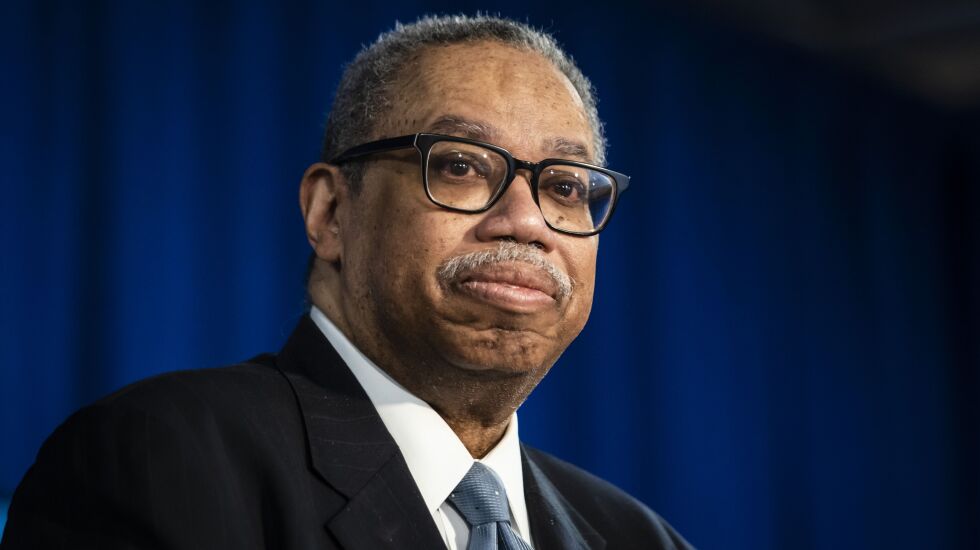
CTA President Dorval Carter Jr. shot down the idea of bringing conductors back to trains, saying it wouldn’t serve a purpose other than being “additional eyes and ears” watching for crime.
“Conductors were removed from CTA for a reason a long time ago, and I don’t have a function that requires a conductor,” Carter said. “What I have done, which I think is just as effective as conductors, is I brought in unarmed security guards who unlike conductors have the ability to move through the trains during the course of its operation and can also be a deterrent” for crime.
“I think it’s helpful to keep in mind how many of my employees get assaulted every year as a result of criminal activity on CTA,” Carter said. “We do not encourage, nor do we want our employees to basically become law enforcement.”
The last time CTA used conductors was 25 years ago when it switched to one-person train operations that the agency said was more efficient and cost-effective.
Carter said CTA’s use of unarmed security guards allows the agency to be nimble and move people around to address hotspots. Union contracts would make that flexibility untenable.
CTA has put $71 million toward an unarmed security force, $30 million to add additional canine units and another $30 million toward CTA’s Voluntary Special Employment program — which pays off-duty police officers to patrol trains and buses. These are all separate from the police department’s transit units.
Carter said he recognized that law enforcement can’t deal with everything — such as people with mental health issues and people dealing with homelessness on transit.
“That’s not a law enforcement problem, that’s a social service problem,” Carter said.
The Active Transportation Alliance, a group working to make transit safe, has called for “transit ambassadors” made up of CTA staffers with backgrounds in social work.
“We are heartened by President Carter’s intention to introduce social service workers. The need for such skilled interventions is urgent and critical,” said Amy Rynell, executive director of the Active Transportation Alliance. “CTA cannot solve the issue of safety on its own, but tactics such as a rapid roll out of improvements to deliver reliable and consistent service as well as immediate introduction of social workers, will go a long way to increase both ridership and safety for all.”
Carter’s comments came in an hourlong interview with the Chicago Sun-Times Editorial Board. He acknowledged the agency’s shortcomings while defending decisions made to address some of those issues.
Carter echoed what CTA officials have said about ghost buses and the issue being tied to the lack of operators. Schedule updates released this week will help with some of the issues, he said.
CTA’s top boss also danced around committing to meeting with the City Council for a public hearing, saying the officials he sends should be sufficient. He dismissed the idea that he wasn’t being transparent by not attending any City Council public hearing by saying he gives updates monthly at Chicago Transit Board meetings.
He also said using it as a reason to block much-needed TIF funding to extend the Red Line to the Far South Side was misguided.
“I have a way to do that [fund the Red Line Extension], it is a way that I used interestingly enough for a similar project on the North Side of the city for which I got all City Council approval,” Carter said. “I’m not doing anything differently now than I was then, but the only difference is that the footprint of the project is on the South Side and not the North Side.”
Carter reiterated that he’s made himself available to every alderperson and is doing everything to keep the agency transparent. He said that to get the TIF approved he is willing to improve communications with alderpersons even more. Whether that means sitting in front of them in a public hearing or behind the scenes, he said, remains to be seen.
“I don’t make it a practice to blow off City Council, I don’t make it a practice to blow off aldermen,” Carter said. “If I did, I wouldn’t have been in this position for as long as I have.”
Ald. Andre Vasquez (40th) recently introduced an ordinance that would force Carter and his executive team to appear before the City Council’s Transportation Committee quarterly. He admitted that Carter has made himself available to alderpersons on an individual basis, but as an official with the CTA he needs to be seen publicly.
“This isn’t about us individually, this is about the public,” Vasquez said. “The number one things we are hearing from our constituents is that CTA is unreliable and unsafe, and while we don’t expect to solve them overnight, it is at bare minimum Carter makes an appearance and answer some questions.”







